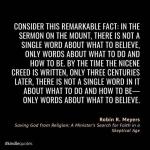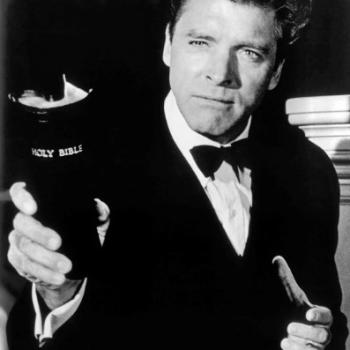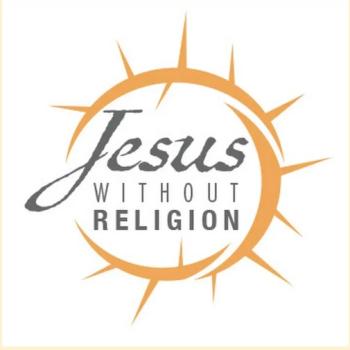
I read a blog that was recently posted on Facebook by a good friend of mine. I have a lot of respect for this person and clicked to the blog to give it a reading. (I had a pretty good idea what I was getting into knowing this person). Sure enough this blogger bemoaned that we have a tyrannical “woke” government, and that the Evangelical church has been silent too long. What? Silent? Since when have Evangelicals ever been silent?
Plus, can someone please define for me what “woke” means? Once and for all…how is being “woke” a bad thing? But perhaps that is another blog post for another day.
So, instead of posting a response to my friend on their timeline, I was motivated to write a response on my own blog-site. That way if someone doesn’t want to read it they don’t have to, and I won’t start a FB war. Writing about these sorts of things is the way that I process and think it through without giving the feeling that I am attacking the person.
But this post really helped me to put several disparate thoughts into a coherence that I’ve been thinking about for a long time. Ironically, their post highlights many of the blindspots and misunderstandings that I believe the Evangelical church lives and breaths by…to their own detriment. So…here is a response to this blog post…I have written it as a FB response.
My Response
Thanks for posting this. I hope you don’t mind if I respond. I totally respect the free speech rights you mentioned that you apparently think are in jeopardy, as I hope everyone does, but I have a few observations about this article that I’d like to mention. Please know, I mean no disrespect in what I am saying. I think that you know that I love you and have nothing but respect for you.
But for better or for worse, here are my five observations about your friend’s blog:
Observation # 1 – Where Has Your Friend Been?
I’m not sure where this author has been since 1980, but Evangelicals have been involved in the political process ever since that time. They have not been on the sidelines. The Moral Majority and a dozen other evangelical organizations have been and still are very active in the political arena.
For this author to say that they have been silenced or have been silent might only apply to them personally but for the Evangelical movement writ large, they are a political powerhouse in the US currently.
In Iowa, the Republican party is run almost entirely by Evangelicals. You will not get a nomination or endorsement in that party in Iowa unless you have the support of Evangelicals. This is true in several other states.
I can tell you a few stories of a few former students of mine (from my Christian School days) who were chased out of the Republican party in Iowa because they weren’t “conservative enough.” They were Christians but weren’t sufficiently conservative so, “out with you.”
Personally, I was chided by some fellow Christians in the 1980’s for not entirely supporting Ronald Reagan. I was told that to be a Christian in good standing, you must support conservative candidates.
So your friend may not remember the influence of the “religious right” and how far back in history it goes. I do, and it is one of the reasons why I have rejected Evangelical Christianity…(note: I haven’t rejected Jesus, the two are not the same). I could no longer accept the politicization of religion. But this leads me to my second observation.
Observation #2 – Not All Christians Are Republicans
Since when has the gospel been defined by a conservative political ideology? The gospel of Jesus Christ is good news for the poor, the marginalized, the poor in spirit, and those that weep. It has nothing to do with a political philosophy or ideology of right-wing or left-wing politics.
The gospel of Jesus isn’t owned by any party or political movement, and it is so much larger than any political idea. Anyone that conflates the message of Jesus with a political ideology is doing harm to the faith and giving aid to a political power system that has no care or need for the good news.
When evangelicals climbed into bed with the Republican party in the 1980’s, it did not sanctify the Republicans, but it diluted the evangelical movement. It is no longer a dynamic movement of love, grace, reconciliation, or forgiveness…it has taken on the same grievance based political rhetoric of the right-wing political class.
Evangelicalism has become the MAGA evangelical movement, supporting perhaps the most immoral of man ever as their standard bearer. Evangelicalism is now only a clanging cymbal and not a force for the transformation of lives. The evangelical movement in my opinion is a shell of its former self, which might be why millions are leaving it today.
The author of this piece seems to think that evangelicals must save the political freedom of people that think they are being oppressed. They seem to have little concern for the freedom of any others than their own group. Here are a few reality checks:
- Many Christians of good-will believed our freedoms were greatly endangered by the Trump administration. Worries about freedom can cut both ways,
- The Covid shut downs which the author describes as an infringement on Christian freedom, began on Trump’s watch not Biden’s,
- Many evangelicals today are actually part of that “woke” movement that the author disparages consequently disowning many of their own brothers and sisters,
- Many people, out of good conscience, respected the government’s rules for health and safety during COVID as part of their duty to “treat others as you would want to be treated,” and didn’t see it as a government plot to steal our freedoms,
- Not all evangelicals believe that ending abortion rights is the correct way to handle unwanted pregnancy and that the life of the mother should come as a higher priority (in keeping with historic Judaism btw).
I could go on, but my point is, not all evangelicals see it the same way as this author. Many ascribe to a different political viewpoint and they are still just as much a Christian as any MAGA Christian.
There are “woke” Evangelicals out there….But that is the issue, isn’t it? To be a “real Christian” this author is implying that you must believe in a right-wing political view that estranges many Christ followers that have a different vision. There isn’t one political viewpoint that can claim to the “Christian” one, but this author seems to make that claim, and of course it is their political view that is the “Christian one.”
Observation #3 – Religion NEVER Sanctifies Politics
Let’s talk about our government, a human political institution. This author seems to think that Christians must rise up and demand their freedoms. That their faith is somehow compromised if a political party passes a law they disagree with. Really? The first century Christians lived under a tyrannical, brutal, and dictatorial Roman regime where the emperor demanded to be worshipped as a deity or else, that was nothing close to the democratic system we have in the US.
Ironically, first century Christians seemed very uninterested in political freedom. It appears to me that this author has misdirected or redefined “freedom” in a way that was never taught by Jesus or his early followers. I don’t think Jesus ever one time, ever, preached about political freedom as part of the good news.
Freedom, it seems to me from the teachings of Jesus, was about a personal spiritual transformation that sets us free to become the most human of humans we can become. To become the most empathetic, compassionate, loving and forgiving humans that we can be. These are attributes that do not depend on political freedom or system in order to possess them. They are a product of the inner kingdom of God that resides in each one of us if we will realize and take possession of it. It doesn’t depend on the political system we live under. It certainly didn’t for first century Christians.
The freedom Jesus talks about transcends political freedom and systems. It is a power of personal choice and agency that can never be taken away by any political system, not Rome and not Washington D.C. To suggest that the evangelical movement should work to ensure political freedom is to deny and misunderstand the power of the spiritual freedom spoken of by Jesus. (This is another reason I’ve rejected Evangelical faith)
I will reiterate, whenever Christians use or align themselves with political power, systems, or parties, it dilutes and damages the faith. It never sanctifies the political system. From Constantine on, the story of Christendom is one of trying to utilize human-political systems to acquire more power for itself, perhaps for good intentions, but ultimately denying the truth of the teachings of Jesus in the process. This grasping at political power never ends well for the faith.
Observation #4 – Ours Is a Pluralistic, Secular Government, Not a Religious Fascist State
So, what is a Christian citizen in the United States to do? Be quiet? Subservient? Acquiescent?
In a democratic system such as ours, it requires and needs the participation of every citizen. Christian, non-Christian, atheist, Muslim, Buddhist, or whatever other religion you can find, they all need to participate.
I taught history and civics for 30 years in both Christian Schools and public schools. I always encouraged students to participate…but not as a church or some sort of evangelical organization. I encouraged students to participate in our political system as citizens, as individuals, that have their conscience informed by whatever source they choose…the Bible, the Constitution, philosophy, empathy, or whatever source they wanted to use as a compass for making decisions.
In fact, I prefer candidates that have an inner compass that connects them to something bigger than themselves, which was and is sorely lacking in Donald Trump.
What I am saying is that evangelicals are just as free to participate in the political process as the atheist or those that are of another faith. They must understand that although their own conscience can be informed by what they might want to call a Christian World View, or Biblical ideology, that doesn’t make it incumbent upon the whole electorate to agree.
Religious faith is not and cannot be the foundation of the body politic…that is not what the founders intended. But if an individual is a person of faith that prays, believes in a loving and forgiving God, is an evangelical, and uses the Bible for personal guidance and decision-making, there is nothing within our system that keeps them from doing that. I encourage their participation.
B.U.T., Behold the Underlying Truth…
The church is not and cannot be a political institution or force in our society in any way without damaging the gospel of Jesus Christ. It simply is not possible, and our system doesn’t allow it.
A Christian can act according to the dictates of their conscience, and I hope they will, but if the body politic doesn’t agree, they have no right to impose a religious ideology on the whole. And they cannot assume that if the electorate and the government doesn’t adopt policies that somehow fit with the religious ideology that the system is somehow compromised or less than moral as this author seems to suggest.
Evangelicals apparently think that even though they are a shrinking proportion of the population (roughly 23%), and their views are becoming less and less popular that they still somehow have the right to impose their beliefs on the system, ostensibly “for their own good.” That is not how our democratic republic works. That is how theocratic-dictatorships work. The American political system doesn’t operate by divine fiat that is defined by a religious minority. You can go to Iran or Saudi Arabia to find that sort of system.
Observation #5 – Evangelicals are Losing the Culture and are Desperate
Evangelicals have failed to draw a distinction between what they are supposed to influence: culture vs. government.
Culture is a non-political, neutral thing that simply describes what the way of life for a group of people. One of the defining characteristics of culture is religion. Culture is not a political system, but it relates to the values that a group of people in a society adopt and agree to live by or share in common.
Government is a human constructed institution that has rules, limits and powers defined in modern terms, by a Constitution. The United States Constitution has constructed a political system that is to be free of religious control or influence. This doesn’t mean that people of religious faith can’t participate in the political system, but it does bar a religious institution or entity from controlling the government powers of state.
Evangelicals mistakenly assume that when someone brings up the “separation of church and state” that they mean to say that the individual Christian can’t participate. That is nonsense. The “separation of church and state” is a principle designed to protect both the institution of state from religious control and influence and safeguard religious institutions from government interference and control. History has shown how destructive this can be when the two are not separated.
Culture on the other hand, is an arena where religions as an institution can influence the ways of life of a society, but not through governmental coercion, but rather, through persuasion and, to use a religious term, preaching. Many would already call our culture a “Christian culture” simply because a majority of residents still identify with that religion. That is fair game. But cultures are influenced by the work, example, and effort of churches and individual Christians to present a way of life that is worthy of emulation and following, voluntarily, not by coercion.
Herein lies the difference. Christians can influence our culture to the degree that the message is compelling and resonating to stimulate people to follow. It is the art of persuasion and showing people the real nature of their faith through action…through compassion….through kindness…charity…sacrifice…and humility.
If the culture drifts from an Evangelical foundation, it isn’t the culture’s fault. Perhaps it is because of the lack of a convincing message and model presented by the faith. Christians in looking for a quick scapegoat and easy way to let themselves off the hook, blame liberals, “woke” people, and atheists. This is an exercise in a massive “missing the point.” Christians can only blame themselves if the culture moves a different direction…not their perceived enemies.
As a substitute, as the culture becomes less and less favorable to Evangelicals, they increasingly and desperately look to a political solution thinking that somehow, they can impose their cultural mandate through political means and through coercion. This never works, and as I pointed out, only serves to dilute the evangelical message further and further.
Passing some laws to coerce a population into conformity with an Evangelical vision of society is only an equation for a religious fascist dictatorship. Evangelicals have been trying to do this since the 1970’s as they perhaps correctly perceived that American culture was changing. But instead of any reflection or soul searching for why Evangelical faith is less attractive to the culture, they opted for a political solution. Gain power by hitching the Evangelical wagon to the Republican party and take control of the culture through coercive, political means.
Even if they succeed marginally by ending Roe as a protection for abortion rights, they will still lose the culture. In fact, any political victories will likely accelerate the loss of cultural affinity with Evangelical faith because it curtails people’s freedoms.
That is my response…Evangelicals are still pointing fingers and blaming the wrong scapegoats for their loss of influence and adherents. If they do not wake up soon, they will be completely obsolete.













